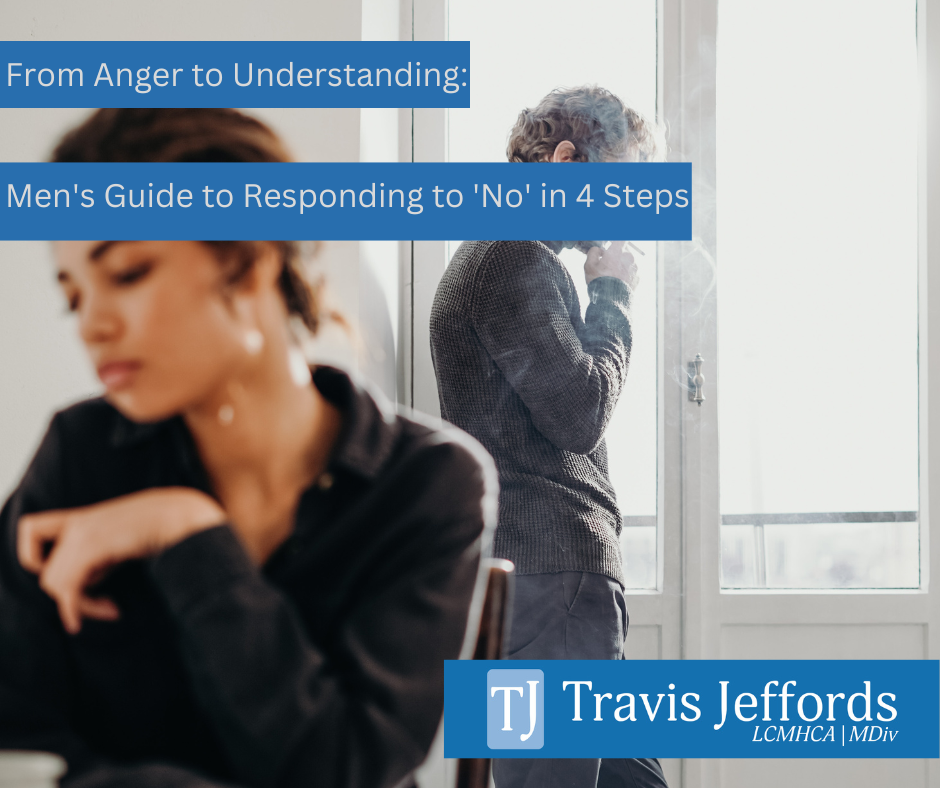Shifting Perspectives: 3 Steps to Reduce Anger through Generous Interpretation
Anger has a way of clouding judgment and perpetuating a cycle of negativity, affecting men's emotional well-being.
If you are seeking a way to break free from this pattern, you're in the right place. In this article, we dive into 3 simple essential steps that can help men reduce anger. By opening our hearts and embracing empathy, we can rewrite the anger narrative and cultivate a more harmonious and fulfilling life.
"The Dress” and the Reality of Perspective
Back in 2015, there was this brief moment in the history where our entire country was basically obsessed with a single picture of a dress. It was a total viral moment. Talk shows were talking about it, social media was re-posting the picture - it was everywhere, and everyone had a take.
Do you remember this picture?:
No one could decide: was this dress white and gold, or black and blue?
At its peak, the Tumblr page (remember Tumblr?!) was getting 14,000 views a second!
The disagreement over the dress, as fun and insignificant as it was, was a beautiful illustration of perspective. It was true for the dress and it is true in life: we see different things. What you do see, however, will have profound impact on your own mental health and anger.
Here are 3 simple steps to reduce your own anger at a situation through generous interpretation.
Step 1: Recognizing Your Interpretation As An Interpretation
The first step is simply to name the interpretation you are giving to a situation that is making you angry, and recognize it for the interpretation that it is. If we’re unable to recognize that what we are telling ourselves about a situation, or another person, is in fact an interpretation, then we’re likely to remain stuck.
Here are examples of initial interpretations that men may have, that will leave them feeling frustrated and angry:
She did this just to get back at me.
He loves pissing me off.
I’ve never met someone so selfish in my whole life.
She’s so lazy!
He’s a total narcissist.
Just like the dress looks like different colors depending on who looks at it, recognizing that these statements and beliefs - which will undoubtedly make you angry - are one particular interpretation about a person.
Recognizing that these statements you’re making to yourself, or others, are interpretations and not facts, is the first step.
Step 2: Stating a Factual Observation of The Event
You’ve recognized that your initial interpretation is biased, and resulting in frustration. Now check back in with yourself and attempt to re-state for yourself the actual event that happened with as little interpretation as humanly possible.
Here are a few examples of observations:
The meeting was scheduled to start at 2:00, and he arrived at 2:10.
Notice in this observation of events there are no interpretations of why this person arrived late, and certainly no conclusions about what kind of person arrives to a meeting at 2:10 instead of 2:00.
Here’s another one:
She went to sleep at 8:32 pm last night.
Again, a factual description of what occurred. A negative interpretation of this event might be something like: she never wants to have sex with me because she’s frigid and cold.
Here’s a final example:
He did not call or text for 48 hours.
We don’t assume we know why he did not call or text, and just note the observable fact that he did not.
Step 3: Give the Most Generous Interpretation Possible.
After we have recognized that our initial interpretation of the events that led to our anger was, just that, an interpretation, we connect with a factual description of the event. Now, it’s time to apply the most generous interpretation of the event possible.
If you were to do a thought experiment and imagine the most generous interpretation - what would it be?
Here’s an example:
Initial Interpretation: I’ve never met someone so selfish in my whole life. He does not respect me or my time.
Factual Observation: The meeting was scheduled to start at 2:00, and he arrived at 2:10.
Most Generous Interpretation: He may have been tied up in an important phone call involving business or personal matters. He values and respects me, but sometimes things come up.
I know I would feel a lot better inside, and a lot less frustrated, if I assumed this person had a legitimate reason for being late.
Here’s another one:
Initial Interpretation: He’s a total narcissist and incapable of caring about anyone but himself.
Factual Observation: He did not call or text for 48 hours.
Most Generous Interpretation: Maybe I just slipped his mind because he is overwhelmed with things in his life right now and struggling to keep track of everything. It’s probably not about me personally, and it’s not a sign of a character deficit on his part. These things happen sometimes.
When The 3 Steps Are Not Enough…
Sometimes if there’s a repeating pattern of events, or a particularly egregious event, it can feel inside like even with our most generous interpretations, we still feel upset.
In these moments, I recommend adding an additional step:
Step 4: Asking for Clarification with a Sense of Curiosity
A lot of times when men ask for clarification, they enter into the conversation from a place of anger or frustration. They are ready to pounce, and the person who they are talking to senses that and reacts to that energy as well.
If you can access a sense of curiosity within you - then you’ll be able to ask for clarification on what happened or is happening and create an air of safety for yourself and the person you’re in conversation with. If you can find it within yourself to trust that - in a way that may not make sense to you right now - the actions of the other person make sense, you may be able to find that curiosity within.
Here’s a possible formula you could use to ask for clarification:
“I’ve noticed that (insert factual behavior), and I was a little confused by (insert what’s confusing). Would you feel comfortable sharing what was going on in that moment?”
Here’s an example from earlier in the article:
“I’ve noticed that our weekly meeting starts at 2:00, and you frequently arrive at 2:10, and I’m honestly a little confused. Would you feel comfortable sharing more about what’s going on?”
Again - the tone that you ask with - finding a true sense of curiosity within yourself is key here. The person who is asked this question is much more likely to sense your curiosity and openness, and respond in kind. The end result will be you end up better understanding the person you’re talking to, which will likely decrease your own anger.
Next Steps…
Managing anger is a vital aspect of maintaining good mental health, and this holds true for men as well.
By acknowledging and addressing anger within ourselves, we can cultivate healthier and more fulfilling relationships. Throughout this article, we have explored three essential steps to reduce anger by embracing the most generous interpretation in our interactions.
However, it's not always easy to navigate our emotions and communicate effectively in the heat of the moment.
That's why I want to offer you a valuable free resource: "The 5 Coping Skills Every Man Needs to Know" video. This resource provides practical techniques to help men stay calm, grounded, curious, and able to listen to our partners more effectively. By incorporating these coping skills into our lives, we can better manage our anger and foster a deeper connection with our loved ones.
Remember, anger is a natural emotion, but it's how we choose to express and channel it that makes all the difference. By embracing generosity in our interpretations, practicing empathy, and equipping ourselves with effective coping skills, we can create a healthier emotional environment within ourselves and in our relationships.
Wishing you the best on your mental health journey.
Hi, I’m Travis.
My clients describe me as calm, compassionate, and curious…
You have these qualities inside you at your core too. You just need a little help uncovering them.
If you’re dominated by anger, anxiety, shame, or self-criticism, we can help you re-connect with who you really are: confident, calm, courageous, compassionate, and connected to yourself and others.
Travis Jeffords - LCMHCA MDiv. | Male Counselor
In-person counselor: Greensboro & Winston-Salem
Virtual counselor: North Carolina
Licensed Counselor

















